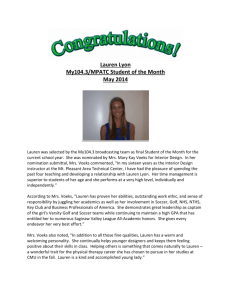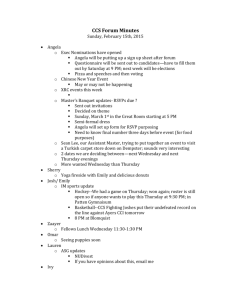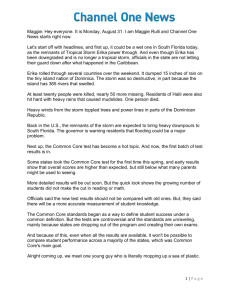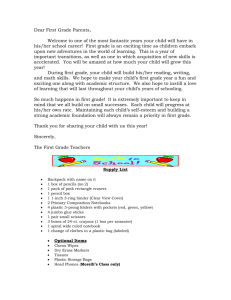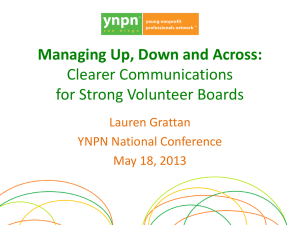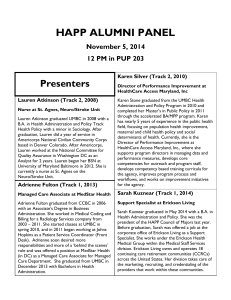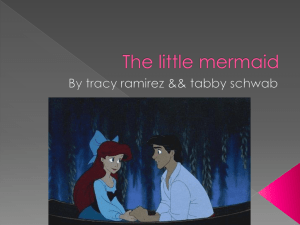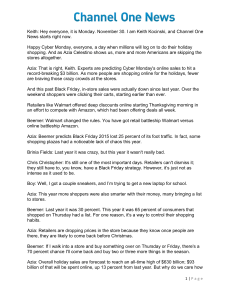April 23, 2015
advertisement
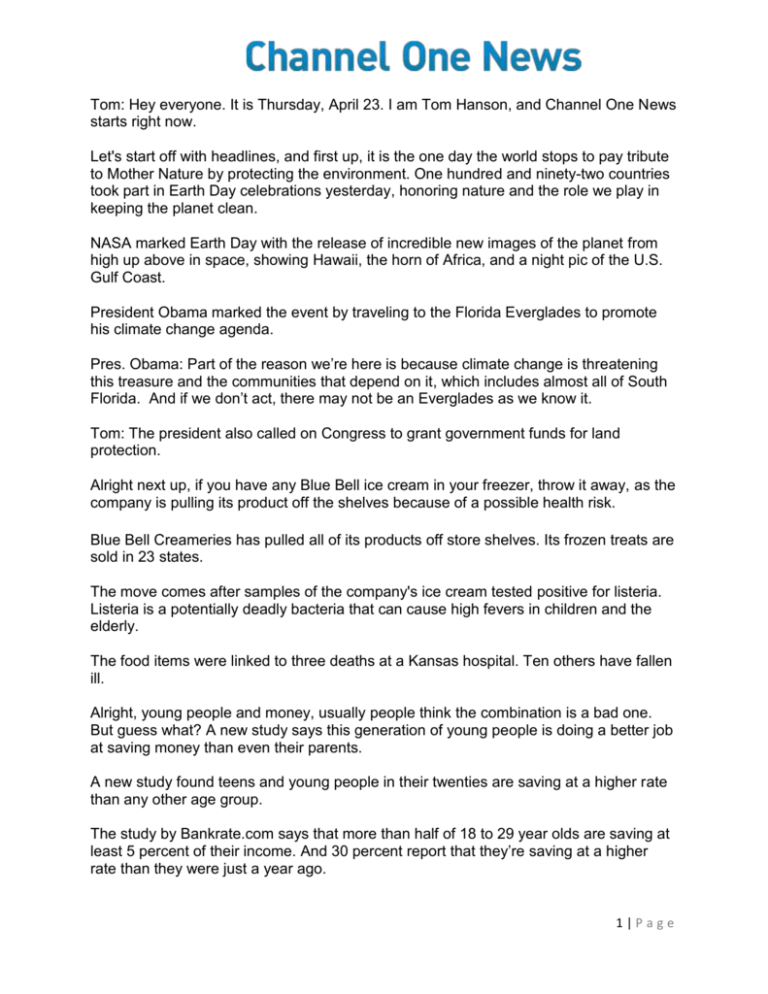
Tom: Hey everyone. It is Thursday, April 23. I am Tom Hanson, and Channel One News starts right now. Let's start off with headlines, and first up, it is the one day the world stops to pay tribute to Mother Nature by protecting the environment. One hundred and ninety-two countries took part in Earth Day celebrations yesterday, honoring nature and the role we play in keeping the planet clean. NASA marked Earth Day with the release of incredible new images of the planet from high up above in space, showing Hawaii, the horn of Africa, and a night pic of the U.S. Gulf Coast. President Obama marked the event by traveling to the Florida Everglades to promote his climate change agenda. Pres. Obama: Part of the reason we’re here is because climate change is threatening this treasure and the communities that depend on it, which includes almost all of South Florida. And if we don’t act, there may not be an Everglades as we know it. Tom: The president also called on Congress to grant government funds for land protection. Alright next up, if you have any Blue Bell ice cream in your freezer, throw it away, as the company is pulling its product off the shelves because of a possible health risk. Blue Bell Creameries has pulled all of its products off store shelves. Its frozen treats are sold in 23 states. The move comes after samples of the company's ice cream tested positive for listeria. Listeria is a potentially deadly bacteria that can cause high fevers in children and the elderly. The food items were linked to three deaths at a Kansas hospital. Ten others have fallen ill. Alright, young people and money, usually people think the combination is a bad one. But guess what? A new study says this generation of young people is doing a better job at saving money than even their parents. A new study found teens and young people in their twenties are saving at a higher rate than any other age group. The study by Bankrate.com says that more than half of 18 to 29 year olds are saving at least 5 percent of their income. And 30 percent report that they’re saving at a higher rate than they were just a year ago. 1|Page That's twice as high as any other age group. But the study also says that young people aren't good at investing their money. They are scared because they watched their parents get burned in the stock market and housing crash at the start of the financial meltdown of 2007. Now experts say you should save at least 10 percent of your income. And you should definitely invest in a saving account or a certificate of deposit. That way, your money is making money by just by earning interest. Now we want to know, are you saving your money? Head on over to Channelone.com to weigh in. Alright coming up, Nazi concentration camps marked one of the darkest times in modern history. But for one of those involved, that dark past is finally catching up. He claims he was just following orders, but 70 years later prosecutors say that line isn't good enough. Today he is an old man, but when he was in his twenties he was a soldier at one of the most notorious death camps in Europe. And this week he is in court in Germany, answering for his actions. Scott Evans takes a closer look at the case. Scott: Hedy Bohm was just 16 years old when she was forced to go to the notorious Auschwitz concentration camp run by the Nazi’s during World War II. Hedy Bohm: I cried after my mom, and she heard me. Scott: Her family was separated when they arrived at Auschwitz. Bohm: We just looked at each other and she didn't say a word. Then I saw her turn and walk away. I didn't know at the time that that was the road that led to the crematorium, to the gas chambers. Scott: More than one million people were killed at the Auschwitz death camps, including both of Bohm's parents. This week, she will testify against a former Nazi soldier, who is now on trial in Germany for war crimes. Oskar Groening, now a frail 93-year-old man, was stationed at Auschwitz. He says he didn't directly kill anybody. His job was just to collect the victims' valuables. He was known as the Auschwitz accountant. At least 11 million people were killed by the Nazis during the Holocaust, including 6 million Jews. So the big question before this court, is Groening guilty because he was part of the group that carried out the killings and knew what was going on? 2|Page Groening pleaded to the court that he was morally guilty because he didn’t try to stop it. But that he was not legally guilty because he was just a 23-year-old soldier carrying out orders. And not everyone is buying Groening's defense. Bohm: I believe it’s a cop out. Scott: Though, in all the German war crimes trials until now, that argument has been successful. But Groening's trial is different. For the first time, instead of proving that Groening was directly responsible for deaths, prosecutors are using a new legal theory that says being a part of the group also means you should be held accountable, guilty by association; one of the reasons why this trial is being watched so closely. Scott Evans, Channel One News. Tom: Given the advanced age of most Nazi war crimes suspects, Groening is expected to be among the last to face trial. We will be right back. We are giving you more green today as we continue our coverage of Earth Week with one girl who makes trash disappear before she even tosses it away. Here is Arielle Hixson. This is 23-year-old Lauren Singer's apartment. And if you look hard enough, you will notice something is missing, the trash. The average person in America throws away 4.4 pounds of garbage a day that ends up in a landfill. But for Lauren, that number is zero. Lauren started living a garbage-free life just a few years ago when a fellow student at NYU had some wasteful habits that made her question what she throws away. Arielle: What inspired you to live a zero-waste lifestyle? Lauren Singer: One day after class I went home and I was going to make dinner and I saw that everything in my fridge was packaged in plastic. And I felt like such a hypocrite because I was getting mad at this girl who was making so much trash and I was just as bad as her. And so I decided in that moment to stop using plastic. Arielle: Lauren lives a life of simplicity, meaning no plastic cups, just mason jars. Her fridge? Stocked with only the essentials. Deodorant and toothpaste? Well, she makes 3|Page her own. And then, there’s the personal things. When you tell people about your lifestyle, what are they most curious about? Lauren: Do I use toilet paper. And yes, I use toilet paper. Arielle: To get a glimpse into a day with zero waste, we went with Lauren to the grocery store, where she does all her bulk shopping. Do you actively think, okay I am going to the supermarket, let me bring my jar? Lauren: Yes. And when you think about it, you actually save money because I need containers for all the things that I'm buying. So I’m not buying things that I don’t need, or I didn’t prepare for. So I save a lot of money. Arielle: No plastic or containers are used during her trip, just cotton cloth bags for nuts and lemons, and her trusty mason jar for olive oil, hair products and an extra green smoothie. Lauren’s lifestyle has some benefits. From eating extra healthy, to living clutter-free, she even started a blog “Trash is for Tossers,” and a Kickstarter funded business called “The Simply Co.,” where she makes homemade laundry detergent from natural ingredients. Lauren: I started my blog to make the process of transitioning to a lower-waste lifestyle easier for someone who doesn't want to do all that research or all that legwork. And so basically, I’m trying to create a guide or a research for anyone who wants to lessen their impact. Arielle: And for her, the only waste she has, from the past two years fits into this mason jar. Lauren: As you can see it's all plastic, produce stickers in here, wristbands from concerts. These are the little plastic things that hold price tags onto clothing. Arielle: And everything else goes to recycle or compost, in a container where food will break down and eventually be used again as soil. Do you see a future where people are not wasting that much trash? Lauren: I totally see a future where people live a no-waste lifestyle because I've seen a past where people have lived a no-waste lifestyle. The way that I lived is the way that our great grandmothers lived. It's nothing novel, it's nothing new. I'm just reverting to a lifestyle before things became individually wrapped. 4|Page Arielle: A glimpse of a no-waste future, by living in the past. Arielle Hixson, Channel One News. Tom: Pretty awesome to see her creating change and taking charge, especially by getting rid of plastic. So here's a question for you. How many plastic bottles are thrown out every hour in the U.S.? Is it 2.5 million, 6 million or 1 million. The answer is on Channelone.com. Ok guys, that's it from us. We will see you tomorrow. 5|Page
